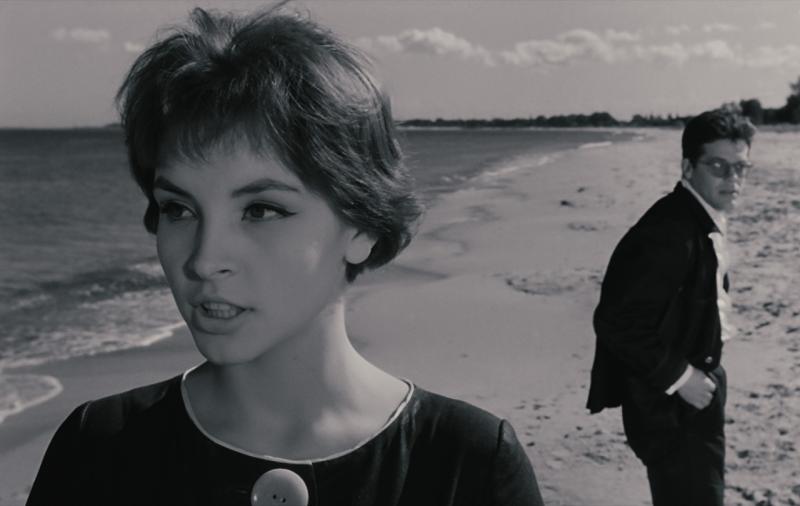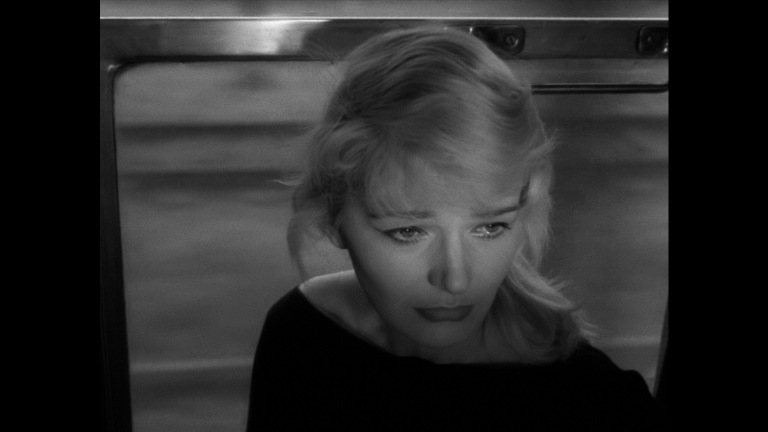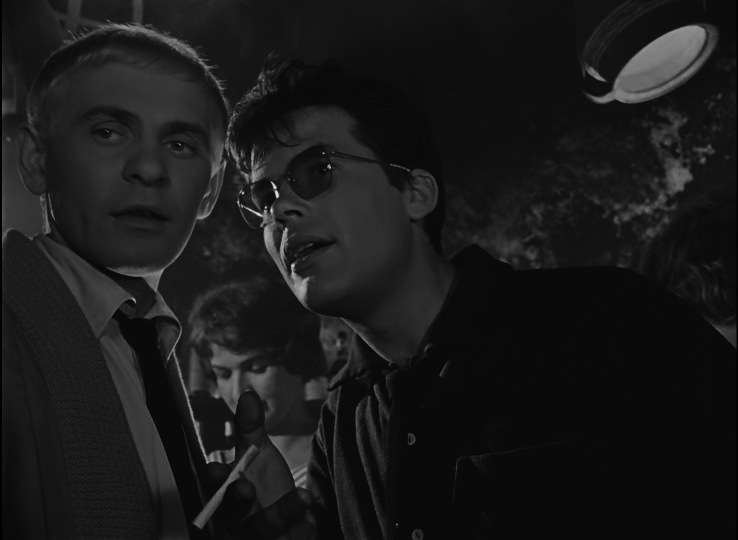DVD: Polish Cinema Classics | reviews, news & interviews
DVD: Polish Cinema Classics
DVD: Polish Cinema Classics
Revisiting the glorious informal brilliance of late Fifties Polish film

There’s a phrase in Andrzej Wajda’s 1960 film Innocent Sorcerers, “spirit of our time”, that perfectly captures the atmosphere of the four films on Polish Cinema Classics, originally dating from 1957 to 1960 whose great black and white photography is very stylishly restored here in Second Run's release.
French critics christened the group of directors and writers who appeared in the mid-1950s as the Polish Film School: stylistically they owed something to the Italian neo-realists (and nothing to the Socialist realists), and certainly passed on something to the French New Wave. They came out of the Lodz film school (a November 2011 interview with Wajda included here as an extra has him remembering how random it was that he went ahead with cinema – literally, a question of whether a day dawned sunny or cloudy: it proved cloudy, so he made the journey to sit the entrance exams, the start of one of the most illustrious careers in Central European film).
 The four films here all came out of the Kadr production house, where Jerzy Kawalerowicz, another veteran of Polish cinema who died in 2007, was a dominant force (his classic Mother Joan of the Angels from 1962 is also available from Second Run). He’s represented here by Night Train (pictured right) from 1959, a stylish thriller about a killer travelling on a sleeper to the Baltic coast that owes much to Alfred Hitchcock. Watch out for some brilliant lensing by Jan Laskowski, who remembers the challenges of the filming process in another DVD extra.
The four films here all came out of the Kadr production house, where Jerzy Kawalerowicz, another veteran of Polish cinema who died in 2007, was a dominant force (his classic Mother Joan of the Angels from 1962 is also available from Second Run). He’s represented here by Night Train (pictured right) from 1959, a stylish thriller about a killer travelling on a sleeper to the Baltic coast that owes much to Alfred Hitchcock. Watch out for some brilliant lensing by Jan Laskowski, who remembers the challenges of the filming process in another DVD extra.
The fact that Night Train went on to be remade by Hollywood seems curiously appropriate, since this was a generation well aware of their place in world cinema. Director Roman Polanski made the journey in the fullest sense (he appears in Goodbye alongside Zbigniew Cybulski, the “Polish James Dean”); composer Komeda followed him to Hollywood, where he scored Rosemary’s Baby, before he died in an accident at the age of 38.
 Andrzej Munk, director of Eroica from 1957, died young too, four years after that film at the age of 41, in a car crash returning from a shoot of his last film, the masterful Passenger (available from Second Run). It looks the strangest film in the new collection, subtitled a “heroic symphony”; its heroism is highly ironic, however, casting a sceptical, darkly comic glance back at events in two distinct stories of Polish resistance to the Nazis.
Andrzej Munk, director of Eroica from 1957, died young too, four years after that film at the age of 41, in a car crash returning from a shoot of his last film, the masterful Passenger (available from Second Run). It looks the strangest film in the new collection, subtitled a “heroic symphony”; its heroism is highly ironic, however, casting a sceptical, darkly comic glance back at events in two distinct stories of Polish resistance to the Nazis.
Wajda’s interview here explains that his contemporaries’ preoccupations were with the events of World War II, and the rise of Communist Poland that followed – his characters in Innocent Sorcerers (pictured above left) were “not my generation”. The censors encouraged him to give his boy-meets-girl film a happier ending, with girl returning to boy (after what must be one of cinema’s longest flirtation scenes): the fact that said hero was a fancy-free philandering jazz fanatic seems to have escaped their attention.
rating
Share this article
The future of Arts Journalism
You can stop theartsdesk.com closing!
We urgently need financing to survive. Our fundraising drive has thus far raised £49,000 but we need to reach £100,000 or we will be forced to close. Please contribute here: https://gofund.me/c3f6033d
And if you can forward this information to anyone who might assist, we’d be grateful.

Subscribe to theartsdesk.com
Thank you for continuing to read our work on theartsdesk.com. For unlimited access to every article in its entirety, including our archive of more than 15,000 pieces, we're asking for £5 per month or £40 per year. We feel it's a very good deal, and hope you do too.
To take a subscription now simply click here.
And if you're looking for that extra gift for a friend or family member, why not treat them to a theartsdesk.com gift subscription?
more Film
 Can I get a Witness? review - time to die before you get old
Ann Marie Fleming directs Sandra Oh in dystopian fantasy that fails to ignite
Can I get a Witness? review - time to die before you get old
Ann Marie Fleming directs Sandra Oh in dystopian fantasy that fails to ignite
 Happyend review - the kids are never alright
In this futuristic blackboard jungle everything is a bit too manicured
Happyend review - the kids are never alright
In this futuristic blackboard jungle everything is a bit too manicured
 Robert Redford (1936-2025)
The star was more admired within the screen trade than by the critics
Robert Redford (1936-2025)
The star was more admired within the screen trade than by the critics
 Blu-ray: The Sons of Great Bear
DEFA's first 'Red Western': a revisionist take on colonial expansion
Blu-ray: The Sons of Great Bear
DEFA's first 'Red Western': a revisionist take on colonial expansion
 Spinal Tap II: The End Continues review - comedy rock band fails to revive past glories
Belated satirical sequel runs out of gas
Spinal Tap II: The End Continues review - comedy rock band fails to revive past glories
Belated satirical sequel runs out of gas
 Downton Abbey: The Grand Finale review - an attemptedly elegiac final chapter haunted by its past
Noel Coward is a welcome visitor to the insular world of the hit series
Downton Abbey: The Grand Finale review - an attemptedly elegiac final chapter haunted by its past
Noel Coward is a welcome visitor to the insular world of the hit series
 Islands review - sunshine noir serves an ace
Sam Riley is the holiday resort tennis pro in over his head
Islands review - sunshine noir serves an ace
Sam Riley is the holiday resort tennis pro in over his head
 theartsdesk Q&A: actor Sam Riley on playing a washed-up loner in the thriller 'Islands'
The actor discusses his love of self-destructive characters and the problem with fame
theartsdesk Q&A: actor Sam Riley on playing a washed-up loner in the thriller 'Islands'
The actor discusses his love of self-destructive characters and the problem with fame
 Honey Don’t! review - film noir in the bright sun
A Coen brother with a blood-simple gumshoe caper
Honey Don’t! review - film noir in the bright sun
A Coen brother with a blood-simple gumshoe caper
 The Courageous review - Ophélia Kolb excels as a single mother on the edge
Jasmin Gordon's directorial debut features strong performances but leaves too much unexplained
The Courageous review - Ophélia Kolb excels as a single mother on the edge
Jasmin Gordon's directorial debut features strong performances but leaves too much unexplained
 Blu-ray: The Graduate
Post #MeToo, can Mike Nichols' second feature still lay claim to Classic Film status?
Blu-ray: The Graduate
Post #MeToo, can Mike Nichols' second feature still lay claim to Classic Film status?

Add comment